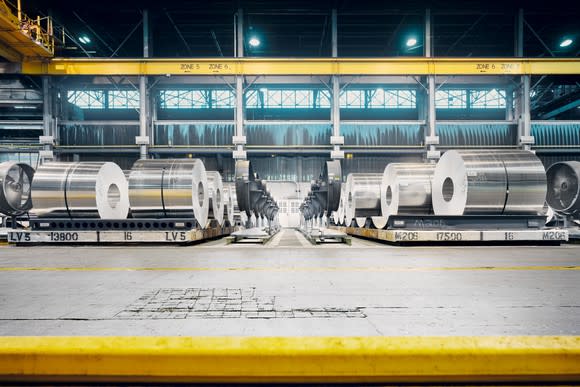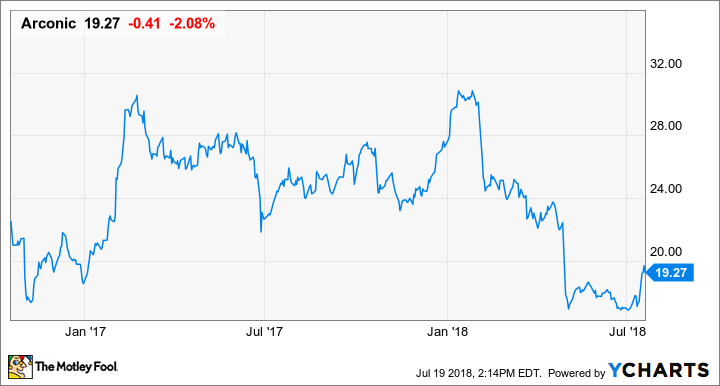An Arconic Buyout Makes Sense, but Not for Investors
Arconic (NYSE: ARNC), a company that seems to have stumbled at every turn since being spun off from Alcoa, saw its shares spike July 16 after reports surfaced that it has drawn interest from Apollo Global Management and other buyout firms.
There's a lot of logic to the rumored talks, both from the company's point of view and for the private equity firms. But longtime shareholders would have ample reason for disappointment if a deal to go private does materialize. Here's a look at what's going on at Arconic today, and what investors should think about as buyout talk heats up.

Aluminum alloy rolls at Arconic's Davenport, Iowa, facility. Image source: Arconic.
A metals clunker
Arconic, a maker of aluminum and other metal parts for the aerospace, automotive, and industrial sectors, was cobbled together via mergers and acquisitions by Alcoa earlier in the decade as an attempt to move away from a reliance on the commodity cycle and toward higher-margin finished products.
The company, as part of the spinoff, was required to relieve most of Alcoa's debt burden, taking on more than $8 billion in obligations. And in the quarters since the split, it has become apparent that Alcoa had done a poor job integrating the businesses it had purchased.
Arconic CEO Klaus Kleinfeld, who headed Alcoa prior to the split and who was the architect of the rollup that became Arconic, was ousted in April 2017 as part of a dispute with activist fund Elliott Management. It took the company until January 2018 to hire his replacement, Chip Blankenship, who in early May said Arconic is plagued by performance "variation" across its 151 production sites that will require increased spending to resolve.
I said in February that if Blankenship can't get Arconic running better quickly, buyout rumors were likely to surface. With it now clear that the company is going to require significant time to streamline its collection of assets and get them performing better, it would make sense for Blankenship to be open to private ownership that would shield him from the pressure to show quarterly improvement and allow him to focus on the long term.
For Apollo or any other private equity buyer, Arconic could end up being a bargain. Reports speculate that Arconic could sell for between $20 and $25 per share, a 20% or higher premium to the company's unaffected price prior to the buyout talks becoming public. That's still only about 10 times forward EBITDA estimates, well less than the 17.5 times forward EBITDA multiple Berkshire Hathaway paid in 2016 for Arconic rival (and much better performer) Precision Castparts.
Both Blankenship and a private equity buyer can hope that time will heal at least some of Arconic's wounds. While the company does have internal issues, it has been beaten down by external factors including tariffs and pricing pressure from key customers like Boeing. In time, those external pressures will hopefully subside, or the company will at least be able to adjust to them. That, coupled with new management improving manufacturing performance, could make Arconic a much more valuable company a few years out.
Bittersweet buyout
Any investor who bought into Arconic just before the buyout talk became public has reason to cheer, but for most holders the stock has been a nightmare. The company's shares are down nearly 30% year to date even after the recent spike, and Arconic today trades below where it did when the separation from Alcoa was finalized.
Even at $25 per share, a buyout would leave many longtime shareholders at breakeven at best.
Given the harrowing ride down, some investors might welcome the chance to get out. But it's worth noting that despite its issues, Arconic does have enviable exposure to red-hot sectors including the narrow-body commercial aircraft market, where it makes a range of parts for planes and engines. The company on July 16 signed a new long-term agreement with Boeing to supply aluminum sheet and plate for all commercial models, relieving some uncertainty about Boeing pricing pressure. Arconic has also announced a collaboration with Lockheed Martin to develop 3-D metal printing techniques.
It would be interesting to know what Elliott Management thinks of this buyout talk, since as of its last report, Elliott still holds 10.59% of Arconic. It wasn't long ago that the fund believed Arconic could be worth $33 to $54 per share if the company followed its advice to overhaul management, clean up operations, and cut costs. With new management in place with a mandate to streamline and bring down costs, the fund might not be eager to accept a discount to that estimated range and let someone else enjoy the potential upside.
Hold strong
Back in February, I suggested that Blankenship might eventually decide to divest Arconic operations that either don't enjoy a strong competitive advantage or can't easily share technologies between units. And the most obvious candidates are its rolled-products business (with $5 billion in sales) and its construction solutions business ($2 billion in sales). It's possible that this sort of deal, and not a sale of the entire company, is what Arconic is discussing with Apollo and others today, or at least where the talks will end up.
Given the drama that has played out, it is understandable that Arconic might enjoy life outside of the public spotlight -- and that some investors might be willing to take the cash and cut their losses.
But to paraphrase a Warren Buffett quote, it feels as if the private equity firms are currently being greedy when others are fearful. Arconic has not been for the faint of heart, but there is value in those assets. The best option for investors right now isn't a sale. It's to hold tight and hope Blankenship and his team can figure out how to get Arconic firing on all cylinders.
More From The Motley Fool
Lou Whiteman owns shares of Berkshire Hathaway (B shares). The Motley Fool recommends Berkshire Hathaway (B shares). The Motley Fool has a disclosure policy.

